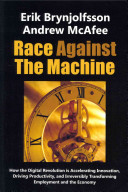Workers Are Being Perpetually Displaced by Technology
The third explanation for America’s current job creation problems flips the stagnation argument on its head, seeing not too little recent technological progress, but instead too much. We’ll call this the “end of work” argument, after Jeremy Rifkin’s 1995 book of the same title. In it, Rifkin laid out a bold and disturbing hypothesis: that “we are entering a new phase in world history—one in which fewer and fewer workers will be needed to produce the goods and services for the global population.”
Computers caused this important shift. “In the years ahead,” Rifkin wrote, “more sophisticated software technologies are going to bring civilization ever closer to a near-workerless world. … Today, all … sectors of the economy … are experiencing technological displacement, forcing millions onto the unemployment roles.” Coping with this displacement, he wrote, was “likely to be the single most pressing social issue of the coming century.”
Notes:
We are innovating ourselves out of jobs for everyday people.
Folksonomies: innovation progress employment
Taxonomies:
/technology and computing (0.443007)
/society/work/unemployment (0.364506)
/technology and computing/hardware/computer peripherals/printers, copiers and fax/fax machines (0.228304)
Keywords:
recent technological progress (0.944431 (negative:-0.389122)), current job creation (0.910769 (negative:-0.462111)), sophisticated software technologies (0.843901 (positive:0.539002)), Jeremy Rifkin (0.799223 (neutral:0.000000)), stagnation argument (0.710957 (negative:-0.462111)), technological displacement (0.649348 (negative:-0.406181)), fewer workers (0.638050 (negative:-0.359851)), everyday people (0.625768 (neutral:0.000000)), disturbing hypothesis (0.617946 (positive:0.552877)), important shift (0.582660 (negative:-0.258959)), unemployment roles. (0.581088 (negative:-0.605907)), new phase (0.572726 (negative:-0.359851)), global population (0.561415 (negative:-0.359851)), world history—one (0.548909 (negative:-0.359851)), social issue (0.542902 (negative:-0.400733)), near-workerless world (0.527667 (positive:0.539002)), millions (0.280838 (negative:-0.605907)), Technology (0.270561 (neutral:0.000000)), jobs (0.270278 (neutral:0.000000)), civilization (0.269052 (positive:0.539002)), economy (0.266481 (negative:-0.406181)), explanation (0.265545 (negative:-0.462111)), America (0.265469 (negative:-0.462111)), problems (0.265280 (negative:-0.462111)), head (0.265015 (negative:-0.462111)), sectors (0.263471 (negative:-0.406181)), end (0.263288 (negative:-0.366607)), book (0.262878 (neutral:0.000000)), title (0.262728 (neutral:0.000000)), Computers (0.261126 (negative:-0.258959))
Entities:
Jeremy Rifkin:Person (0.869680 (positive:0.512293)), America:Continent (0.238682 (negative:-0.462111))
Concepts:
Technology (0.947364): dbpedia | freebase
World population (0.701052): website | dbpedia | freebase
Prehistory (0.698152): dbpedia | freebase | opencyc
Innovation (0.689047): dbpedia | freebase
History of science and technology (0.676567): dbpedia | freebase
Jeremy Rifkin (0.675480): dbpedia | freebase | yago
Population (0.661233): website | dbpedia | freebase | opencyc
Goods (0.659745): dbpedia





